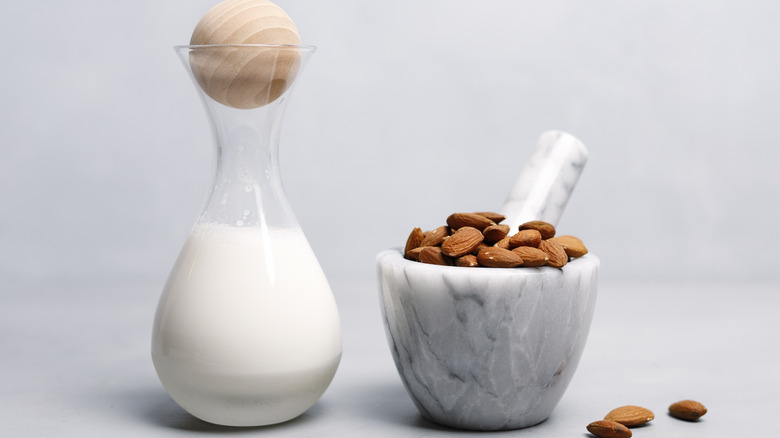The Unexpected Milk That Will Have You Drifting Off To Sleep In No Time
Sometimes, the concept of drifting off to sleep seems like the stuff of fairytales, not real life. Instead of chirping birds and a murmuring brook lulling us to bed, we're met with anxious thoughts and restlessness that keep us up, staring at the ceiling, and counting the seconds away.
Getting quality sleep is important for a number of reasons. In fact, it is as important as exercise and diet when it comes to affecting your mental health, brain health, immune system, and more. Waking up irritable, foggy, and tired when you should be feeling rested and energized is the worst feeling ever. Times like these call for foods you never knew could help your sleep, one of which is almond milk.
Although the research done so far has been on almonds or almond oil, almond milk — made by blending soaked almonds with fresh water and other additives and then straining the liquid — could potentially offer the same benefits. A study published in the Journal of Ethnopharmacology found that violet oil, made either using almond oil or sesame oil, had a significant positive impact on people with insomnia when compared with the placebo. Consuming sweet almonds for two weeks helped students of the Tehran University of Medical Sciences (TUMS) combat insomnia, according to a study published in the Iranian Journal of Public Health. How does almond milk help you sleep better?
The nutrients in almonds that promote sleep
Almonds contain tryptophan, melatonin, and magnesium, all of which have been associated with better sleep. Tryptophan is the essential amino acid responsible for why you feel drowsy after a good turkey dinner. It's abundantly available in turkey and almonds. But there's an unexpected way in which tryptophan works to stimulate drowsiness: it is involved in the creation of serotonin, the hormone that influences your mood and sleep, among other things. There is, however, some debate on just how much tryptophan you'll need to happily drift off to sleep.
Even so, you probably already know that melatonin plays a key function when it comes to your sleep and wake cycles. Your melatonin levels increase in response to darkness and put you in prime condition for sleep, and although your body produces melatonin on its own, sometimes you can help the process along by adding foods that contain the stuff.
The effects of magnesium on sleep are multi-pronged. The mineral reduces your stress hormone cortisol, promotes the production of melatonin, and plays a role in regulating gamma-aminobutyric acid (GABA), the neurotransmitter involved in calming the nervous system. Additionally, it is thought to promote muscle relaxation by inhibiting a neurotransmitter called the N-methyl-D-aspartate receptor. In addition to sleep-inducing nutrients, almonds are a good source of healthy fats, fiber, and protein.
Drinking almond milk for better sleep: What should you consider?
It must be said that almond milk might not contain as high a concentration of sleep-inducing nutrients as the actual nuts do, so if you really want the good stuff, you may want to stick with the source. A lot of the nutrients get diluted in the manufacturing process. (In fact, we tried plain almonds for sleep, and here's how it went.) You could, alternatively, try making almond milk at home.
That being said, choosing almond milk from the stores requires a bit of thought too. Not everything you see on the shelves is good for you. There are a few ingredients you need to watch out for in almond milk, like emulsifiers and carrageenan, per registered dietitian nutritionist Danielle Gaffen (via HuffPost). Both of those can be irritating to your gut and have been linked to inflammation and digestive problems. Salt and sugar content are some other things to watch out for. Choose an unsweetened version with very little or no sodium.
There are also fortified ingredients that you should be looking for in your almond milk, such as calcium, protein, and vitamin D. As for when to consume the almond milk, there's no specific research on this. We'd recommend not having the drink too close to bedtime. You don't want to add digestion to the list of chores for your body when you're trying to sleep, and you certainly don't want to wake up to pee in the middle of the night.



